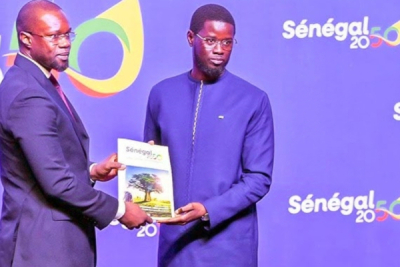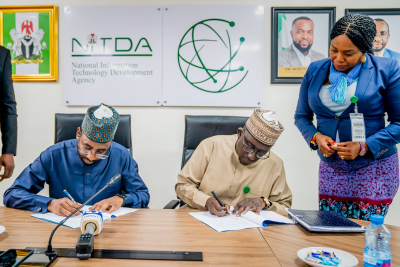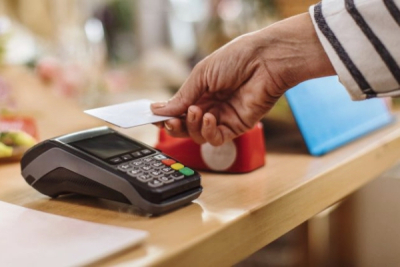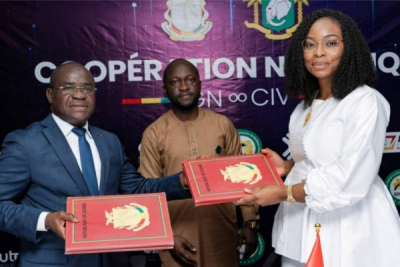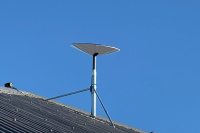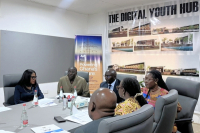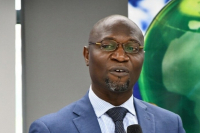The Senegalese government is embracing artificial intelligence as a powerful tool for driving development across all sectors. As part of its strategy, the government is exploring the establishment of a dedicated AI computing center, along with other initiatives.
The Senegalese Ministry of Communication, Telecommunications, and Digital Economy, in partnership with the French Embassy and AI HUB Senegal, has launched a seed fund of 59 million CFA francs (approximately $98,222) to support the development of artificial intelligence (AI)-based solutions. The call for applications, unveiled on Saturday, October 12, is open until Tuesday, October 15.
As part of this initiative, grants ranging from €5,000 ($5,466) to €10,000 will be awarded to Senegalese entrepreneurs across various sectors. These include agriculture, education, energy, e-commerce, finance, healthcare, business services, transportation, and more.
In the application form, entrepreneurs are asked to explain how their solutions stand out from those already available on the market. "This could involve aspects such as the use of advanced technologies, a novel approach to solving a problem, an innovative production or service delivery method, or significant added value that addresses an unmet need."
This initiative aligns with ongoing efforts by the Senegalese government to accelerate the development of artificial intelligence. For example, the government is considering building an AI computing center in partnership with U.S. tech giant Meta. This project, discussed in September during the 79th United Nations General Assembly, fits within Senegal’s new digital transformation strategy, SN 2034, known as the "Technological New Deal." Through the fourth pillar of this strategy, the government aims to create a conducive environment for technological innovation and entrepreneurship.
According to a study from the *International Journal of Science and Research Archive*, the integration of AI technologies allows small and medium-sized enterprises to leverage data for informed decision-making, enhance operational efficiency, and tailor customer experiences. In agriculture, for example, the Global System for Mobile Communications Association (GSMA) notes that "AI tools can provide real-time data, perform predictive analytics, and execute algorithms to optimize farming practices, improve crop yields, enhance product quality, facilitate access to markets and credit, and reduce production costs."
Isaac K. Kassouwi
He is a passionate entrepreneur and business leader who applies his technological skills to support small and medium-sized enterprises in Liberia. He also runs an e-commerce company.
Christopher Fallah is a Liberian computer scientist and entrepreneur. He is the founder and CEO of Annita Store, an e-commerce platform that connects small businesses and vendors with customers. Launched in 2021, Annita Store facilitates access to essential services while offering a diverse shopping experience, enabling vendors to tap into international markets.
The platform provides various tools and resources to help sellers optimize their sales and grow their businesses. It is designed to help vendors promote their products and connect with their target audiences. For customers, Annita Store offers a wide range of products across different categories, including electronics, fashion, health and wellness, and beauty. The platform also features promotions and special offers, partnering with trusted suppliers to ensure the quality of the products.
"We take pride in presenting a diverse range of high-quality products alongside outstanding customer service, aiming to guarantee a satisfying shopping experience for every customer and consistently deliver the best possible support," reads a statement on the startup’s website.
In addition to his work at Annita Store, Christopher Fallah manages social media and content for Rhona Beauty, a U.S.-based beauty company. He holds a bachelor's degree in computer science, information science, and support services from BlueCrest University College in Ghana, where he graduated in 2021.
From 2022 to 2023, he served as the sales manager at Prestige Motor Corporation, the exclusive Ford dealership in Liberia. In 2024, he won first place in the Orange Social Venture Prize for Africa and the Middle East (POESAM) for Liberia.
Melchior Koba
In recent years, the digital sector has become a key contributor to Senegal's economic and social development. In the coming years, the government plans to intensify its efforts and fully capitalize on the opportunities offered by this rapidly growing industry.
Senegal On Monday, October 14, officially presented its national development plan for 2050. Titled ‘Senegal 2050,’ the plan outlines the country’s path to economic transformation. Digital technologies play a key part in this path.
"Today, digital technology is revolutionizing the global economy. Our goal is to make it the driving force behind Senegal's future economy by promoting widespread adoption. This will enhance daily life, stimulate economic growth, and strengthen governance," said Victor Ndiaye, CEO of the consulting firm Performances Group and co-author of the national development plan.
Over the next 25 years, Senegal aims to digitize all sectors of its economy. Priorities include the digitization of land and real estate, an initiative designed to enhance fairness in land access and improve tax justice. Additionally, a reliable digital identity system will be implemented to allow citizens to easily connect to various online services.
The development of quality infrastructure, such as campuses dedicated to innovation and training, along with robust digital networks, is also at the heart of this strategy. The plan includes the creation of new smart cities, which will serve as hubs for technological and economic development.
In terms of human capital, the document emphasizes the creation of a dynamic ecosystem of economic activities and small and medium-sized enterprises (SMEs), supported by three to four key growth sectors. These sectors will be driven by local champions aiming to produce high value-added goods for export.
Education and training will be central to this digital transformation. Schools, universities, and training centers will integrate advanced technology learning into their curricula, preparing all Senegalese to participate in the new digital economy.
The implementation of these projects will be detailed in the national digital strategy, the "Technological New Deal," currently under development. This plan will outline the concrete steps to achieve these ambitious goals. The ultimate objective is to ensure an inclusive and sustainable digital transformation, positioning Senegal among the region's most advanced economies by 2050.
Samira Njoya
Agriculture remains an essential component of the African economy. The sector plays an important role in maintaining livelihoods, particularly in rural areas. It guarantees food security and creates wealth.
The National Information Technology Development Agency (NITDA) and the National Agricultural Development Fund (NADF) will work together to promote the use of cutting-edge technologies in the national agricultural sector. Through a variety of tools, including unmanned aerial vehicles (UAVs), artificial intelligence (AI), the Internet of Things (IoT), data analytics and robotics, the two partners are committed to improving the productivity and sustainability of Nigerian agriculture.
The signing of a partnership agreement to this effect was unveiled on Thursday, October 10. On its X page, NITDA stresses that this collaboration “is designed to stimulate innovation, leading to increased efficiency and higher yields, thus supporting national efforts to achieve food security.”
According to data from the Nigerian Bureau of Statistics, agriculture is a major pillar of the Nigerian economy. It accounts for 1/5 of gross domestic product (GDP). In the first quarter of 2024, the agricultural sector grew by 0.18% (year-on-year) in real terms, an increase of 1.08% points on the corresponding period of 2023. However, the sector contributed 21.07% to overall GDP in real terms in Q1 2024, lower than in Q1 2023 and Q4 2023, which stood at 21.66% and 26.11% respectively. The single crop production sector accounted for 19.24% of GDP.
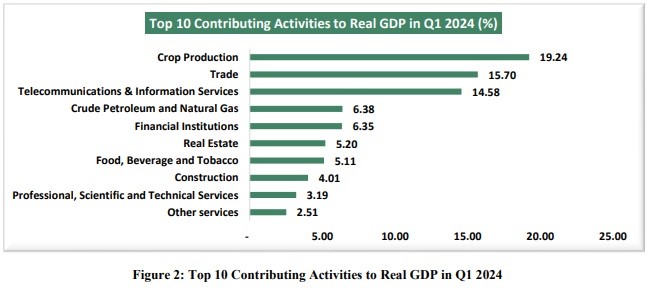
Taking advantage of technology in Nigerian agriculture is a source of economic diversification. The development of intelligent agriculture can reduce the country's dependence on hydrocarbons. What's more, a modern, innovative agricultural sector will help attract foreign investment, thereby strengthening the Nigerian economy.
Hikmatu Bilali
Like many African countries, Algeria is striving to improve living standards and modernize its infrastructure. The launch of an instant payment system is part of these efforts to achieve sustainable prosperity and enhance financial inclusion.
Algeria plans an instant electronic payment system in the coming months, according to Nabil Dahia, Deputy Director General of the Interbank Pre-Clearing Center (CPI). The announcement was made during the International Conference on Digital Payments, organized last week by the Algerian Ministry of Finance and the Bank of Algeria, in partnership with the Arab Monetary Fund (AMF).
"Bank of Algeria is preparing the launch of the instant payment system project to achieve strategic goals related to financial inclusion, improve access to payment services, and reduce the costs and risks associated with transactions," said Nabil Dahia.
The upcoming system will allow financial transactions to be completed online instantly, enabling merchants to receive payment amounts immediately. Currently, funds paid by customers are credited to the merchant’s account after a delay of up to 72 hours. This marks a significant step forward in banking services, aiming to streamline payments and facilitate transactions.
This initiative is part of the government’s broader efforts to promote the adoption of electronic payments and the widespread use of digital banking services. It also aims to accelerate the digitization of commercial transactions and boost financial inclusion by making modern payment services more accessible to all citizens, including the unbanked.
These efforts are already yielding results, as shown by the latest report from the International Telecommunication Union (ITU) on ICT development. Published in June, the report awarded Algeria a score of 80.9 out of 100, a significant increase from the 77.8 points it received in 2023. This improvement reflects the government’s concrete actions to modernize its digital infrastructure and enhance access to ICTs.
The launch of the instant payment system is expected to bolster the country's competitiveness in the digital economy, simplify transactions for businesses and individuals, and contribute to reducing cash usage. It could also pave the way for further banking innovations, such as mobile wallet integration and the expansion of inclusive financial services, particularly for rural populations.
Samira Njoya
ICTs are at the heart of digital transformation, which has become a major priority for many African governments. To achieve their goals more quickly, states are relying on partnerships and mutual collaborations.
Côte d'Ivoire and Guinea, on Friday, October 11, signed two memorandums of understanding to accelerate their respective digital transformations. Signed by Kalil Konaté, Ivorian Minister of Digital Transition and Digitalization (photo, left), and Rose Pola Pricemou, Guinean Minister of Posts, Telecommunications, and the Digital Economy (photo, right), the agreement is the result of extensive negotiations, Guinea announced in an official statement.
“This agreement, the result of extensive negotiations, aims to strengthen cooperation and pool expertise in several strategic digital sectors, including fiber optic interconnection, collaboration in postal services, and the sharing of skills in telecommunications and digital technologies,” the statement reads.
In addition to physically interconnecting infrastructures, the agreement outlines plans to develop innovative digital services, enhance cybersecurity, and promote digital inclusion. Pilot projects are planned in smart agriculture, digital health, and online education.
This initiative is part of a broader regional effort to deepen digital integration in West Africa, with the ambition of creating a single digital market. It supports the modernization efforts of both countries across various sectors while encouraging the development of robust telecommunications infrastructure and improving digital services.
The cooperation is expected to improve the quality and coverage of connectivity services in both countries. According to the latest official data, Guinea has 13.4 million mobile subscribers and 7.7 million Internet users out of a population of approximately 15 million. In Côte d'Ivoire, mobile phone penetration stands at 172.2%, while Internet penetration reaches 93.7%, according to the Telecommunications Regulatory Authority (ARTCI).
Samira Njoya
Satellite internet extends coverage to remote areas lacking infrastructure. These services are ideal for reaching remote areas where traditional broadband infrastructure faces several challenges, including complex geography.
Mali's military government has lifted a seven-month ban on the import and sale of satellite equipment from US company Starlink. This will allow individuals to reconnect to the service identified as illegal in March 2024. The information was revealed in a communiqué issued by the Council of Ministers on Wednesday, October 9, 2024.
The first phase of the suspension of Starlink was aimed at dismantling the terminals already present in the country. The second phase was to examine the feasibility of using the said equipment legally in Mali, “in order to have one or more official interlocutors that the national services can control”, emphasized the government. A way of starting afresh with a clearer vision of the number of devices and their owners.
Starlink's return to favor marks a strategic shift in the country's approach to Internet access. Above all, it reflects confidence in the state's ability to regulate the acquisition and use of this technology. The government previously worried that armed groups linked to Al-Qaeda and the Islamic State could exploit this high-speed Internet service to boost their communications, particularly in the northern and eastern regions where restricting Internet access was seen as crucial for security.
The six-month suspension period should enable regulators, ISPs, and authorized operators to work together to ensure the safe use of Starlink within the framework of Malian legislation. However, the authorities remain concerned that some previously sold kits may still be in the hands of unidentified users.
The reintroduction of Starlink in Mali could be a step towards balancing the need for connectivity with national security concerns, especially as Internet access now plays a major role in socio-economic growth. Only 33.1% of the Malian population had access to the Internet at the start of 2024, reveals DataReportal.
Hikmatu Bilali
He leverages the latest technologies to help Ivorian cocoa producers maximize their production. His innovative solution has won several awards.
Amadou Aziz Kamagate (photo) is an Ivorian developer specializing in artificial intelligence (AI) and machine learning. He is better known as one of the co-founders of CocoaShield, a tech solution aimed at combating swollen shoot, a virus that affects cocoa plantations.
CocoaShield, an agritech startup launched in 2023 by Kamagate, Florian-Kevin Konan Saraka, and Topka Grace-Kelly, leverages AI and the Internet of Things (IoT) to detect and limit the spread of swollen shoot. Through drones and mobile AI-equipped devices, the disease is visually identified, while smart stations monitor plantation conditions in real time.
This approach allows for targeted treatment of infected trees and paves the way for the long-term eradication of the virus. In September 2024, CocoaShield won the Orange Social Entrepreneur Prize for Africa and the Middle East in Côte d'Ivoire.
In addition to his role at CocoaShield, Kamagate is a senior software engineer at Stanbic Bank in Côte d'Ivoire. He earned a bachelor's degree in computer programming in 2019 from Pigier Côte d'Ivoire, followed by a master's in big data for augmented and human reality from the École Supérieure des Technologies Industrielles Avancées (ESTIA) in 2023. That same year, he also obtained a master's in AI and big data from the École Supérieure Africaine des TIC (ESATIC).
Between 2020 and 2021, Kamagate worked as a software engineering intern at Allianz Côte d'Ivoire, an insurance company. In 2022, he served as a software engineering consultant for Moov Africa Côte d'Ivoire. In 2023, he won first place at the Orange Summer Challenge Côte d'Ivoire.
Melchior Koba
Like most African countries, Ghana is following its digital transformation roadmap. Various projects are supporting the achievement of this goal.
Ghanaian authorities plan to launch a $5 million fund to support technological innovation in the country. This was announced by Finance Minister Mohammed Amin Adam on Tuesday, October 8, during a visit to the site hosting the digital center at the University of Ghana.
“We are also establishing a US$5million endowment fund to support the management of this hub. So, everything that’s required to make it a complete digital village in the provision of skills to the youth of Ghana will be done. […] We want to train a million youth in digital skills, and it is not a task that cannot be done,” he said.
This initiative comes as African countries increasingly require a skilled workforce to keep pace with the digital transformation that has been underway for several years. According to a study highlighted in the report "Digital Skills in Sub-Saharan Africa: Spotlight on Ghana," the International Finance Corporation estimates that around 20% of Ghanaian companies surveyed only recruit abroad for digital skills, mainly because they cannot find qualified local talent.
However, the same report estimates that $4 billion will be needed to train the local population in digital skills by 2030. In response, the government has set a goal to train 1 million young people in these skills. The construction of four digital centers is part of this effort. In addition to the University of Ghana, these centers will also be built at the Kwame Nkrumah University of Science and Technology (KNUST) in Kumasi, the University of Cape Coast (UCC), and the University for Development Studies (UDS) in Tamale.
Adoni Conrad Quenum
With more consumers and businesses relying on fintech, the potential for unauthorized or mismanaged investments rises. This underscores the need for robust regulatory frameworks to protect users and enhance market stability.
The Securities and Exchange Commission (SEC) of Nigeria has announced its plans to crack down on fraudulent activities within the country’s rapidly growing fintech sector to protect investors and maintain market integrity. Speaking at the Nigeria Fintech Week, held from October 8-10, SEC’s Director-General Emomotimi Agama emphasized the importance of safeguarding the public interest while fostering innovation within the sector.
He highlighted the potential risks that unregulated fintech operations pose, such as unauthorized data use and unverified fundraising efforts.“We cannot afford to leave this growing sector unchecked. Large amounts of investment data could be misused without consent, and companies are increasingly raising public funds without adequate regulatory control,” Agama said.
The regulatory body aims to enforce “smart regulations” tailored to the fintech landscape, aimed at curbing fund mismanagement and ensuring legal compliance across the industry. Both public and private fintech companies engaging in fundraising activities would need to comply with the SEC’s standards.
This move by Nigeria’s SEC reflects a broader trend towards increased scrutiny within the fintech sector, as regulators worldwide seek to balance technological advancement with investor protections and consumer rights. To ensure a balanced approach, the SEC plans to introduce a three-pronged strategy focused on regulatory compliance, bolstering stakeholder confidence, and validating investor protections.
Fintech fraud is a significant concern in Nigeria, underscoring the importance of the SEC’s recent regulatory measures. Wema Bank’s suspension of several fintech partners highlights Nigeria's ongoing challenges in tackling fraud within its financial system. In a similar move, Fidelity Bank imposed restrictions on fund transfers to neobanks like Kuda Bank, OPay, Moniepoint, and PalmPay in 2023, aiming to curb financial misconduct and protect customer funds. These actions underscore the financial sector's proactive efforts to tighten security and reduce the risk of illicit activities in the growing digital payments landscape.
According to the Financial Institutions Training Centre’s (FITC) Q2 2024 Fraud and Forgeries report, in Q2 2024, Nigerian banks reported losses of ₦42.6 billion (over $55 million) due to various types of fraud—a sharp increase of 637% compared to the previous year. Most of this was attributed to miscellaneous fraud types, along with withdrawals and computer/web fraud related to fintechs. To this end, banks including Wema Bank and Fidelity Bank suspended several fintech partners. This rise in fraud highlights the urgency for stricter regulations to mitigate risks associated with fintech operations and protect investors.
According to Fintech Global, Nigeria’s fintech market accounted for 42% of the total investment made in African fintech in Q3 2023, and it continues to attract significant global interest. However, with such rapid growth comes the risk of financial mismanagement and investor fraud. The SEC’s focus on "smart regulation" aims to address these issues by implementing tailored regulations that promote innovation while ensuring compliance and investor protection.
Hikmatu Bilali
More...
The Senegalese government aims to modernize its economy by integrating information and communication technologies (ICT) across all sectors. To achieve this goal, the administration is developing a clear roadmap outlining the key steps needed to accelerate the country's digital transformation.
Senegal is preparing to adopt a new digital transformation strategy, SN 2034, dubbed the "New Deal Technologique." This strategy, built around four major pillars, was presented on Wednesday, October 9, during a workshop in Dakar to sectoral ministries and public organizations.
The first pillar focuses on establishing the necessary infrastructure to ensure technological sovereignty. This includes the creation of a sovereign cloud, developed in partnership with Google, to meet the growing needs of Senegalese and African administrations and businesses. The second pillar aims to provide affordable Internet access for all citizens, including those in remote and border areas. Discussions are underway with submarine cable and satellite connectivity providers such as Starlink and Google.
The third pillar centers on developing digital skills, with a focus on emerging technological fields such as artificial intelligence. U.S. companies Meta and Nvidia have been approached to support this goal. Finally, the fourth pillar, building on the previous one, seeks to foster a favorable environment for innovation and tech entrepreneurship. A memorandum of understanding has already been signed with U.S. firm Google to provide AI solutions and Google tools to accelerate the growth of Senegalese startups and SMEs.
The SN 2034 strategy, currently under development, will replace the SN 2025 strategy, which was implemented in 2016. It is part of the broader national transformation agenda, "Senegal 2050." Welcomed by tech companies during President Bassirou Diomaye Faye's recent visit to New York, these firms have committed to supporting the government in its implementation. This new strategy represents a major turning point for Senegal's digital future.
Samira Njoya
The International Telecommunication Union (ITU) ranks Seychelles as one of Africa's most technologically advanced nations. However, the organization stresses the need for continued advancements in cybersecurity.
On Wednesday, October 9, Seychelles approved the necessary steps to join the Budapest Convention on Cybercrime. As part of this process, it was also recommended to make minor adjustments to the country's Computer and Cybercrimes Act (CRCA) to refine definitions, improve procedural laws, and enhance international cooperation.
"The Budapest Convention is considered as the most modern convention that helps all countries to fight against Cybercrime. By being part of the Budapest Convention, it will give us access to higher levels of international cooperation, which will put us as a country on par, in line with international standards," stated Ahmed Afif, Vice President of Seychelles.
This initiative aligns Seychelles' legal framework on cybersecurity with international norms, as outlined in its National Cybersecurity Strategy 2019-2024. Through this strategy, the government aims to make the country more resilient to cyber threats, ensuring continued use of ICT to foster economic and social development.
Seychelles is the third most advanced African country in ICT development, according to the International Telecommunication Union's (ITU) Measuring Digital Development – ICT Development Index 2024, published in late June 2024. The country achieved a score of 84.7 out of 100, just 3.4 points behind the leader, Morocco. The average score across Africa (47 countries) was 50.3 points.
However, in terms of cybersecurity, Seychelles ranks in the "Evolving" category alongside 20 other African nations, according to the Global Cybersecurity Index 2024 (GCI) by the ITU, released in September 2024. The country excels in legal measures and cooperation but has notable gaps in technical, organizational, and capacity development areas.
Isaac K. Kassouwi
Like many African nations, Mauritania and Algeria have made digital technology central to their economic development. However, to successfully achieve digital transformation, these countries must bolster their cybersecurity efforts.
On Tuesday, October 8, Algeria's National Authority for the Protection of Personal Data (ANPDP) and its Mauritanian counterpart signed a partnership agreement to strengthen their cooperation through the exchange of experiences and expertise in personal data protection.
"This agreement will establish an ideal framework for cooperation in personal data protection, leading to important decisions and recommendations," stated Samir Bourehil (photo, right), president of the ANPDP.
This partnership is expected to enhance the cybersecurity of both Mauritania and Algeria, as these countries place digital transformation at the center of their economic development. The agreement comes at a time of rapid growth in digital commerce, where data flows are increasingly crossing national borders, according to the World Bank.
"Crossborder remittances or cross-border e-commerce requires consistent rules across countries to provide similar level of consumer protection. Reaching regional consensus on data protection standards is needed to ensure compatibility and avoid fragmentation," the Bretton Woods institution noted in its report Regulating Digital Data in Africa, published in May 2024.
Isaac K. Kassouwi
Developed to assist fashion designers with the daily management of their businesses, it also includes an integrated online store.
ProCouture is a digital solution developed by an Ivorian startup. The company, founded by Adama Bakayoko, aims to help tailors, particularly those in the informal sector, better manage their workshops.
"Of all the tailors we’ve worked with, only a few know how much they earn each month. It’s important to have data, indicators. [...] The software allows you to check if the business is doing well," explains Adama Bakayoko.
The solution is available on iOS and Android, with over 500 downloads according to Play Store data. Users create an account to access the platform’s various features, which include appointment reminders, customer management, cash flow tracking, production management, and supplier coordination. A key benefit is that better management of their workshops could help tailors secure financing from financial institutions.
ProCouture also integrates an online store, enabling tailors to enter the ready-to-wear market via the mobile or web app. From a computer or smartphone, they can manage this online store along with their daily customer orders. Access to the platform’s features requires a subscription, costing 3,000 FCFA (about $5).
In 2024, the startup won second prize at the Ivorian stage of the Orange Social Entrepreneur Prize for Africa and the Middle East.
Adoni Conrad Quenum




